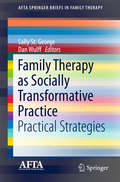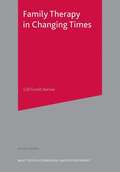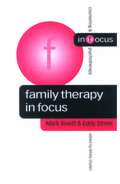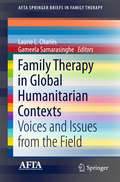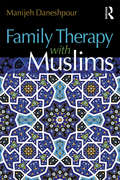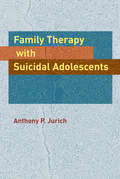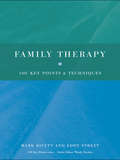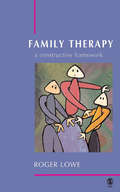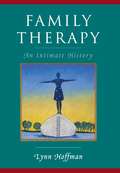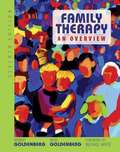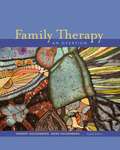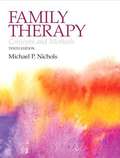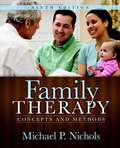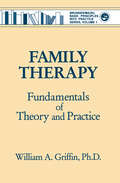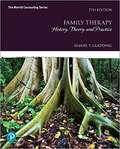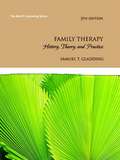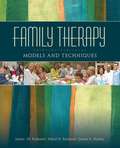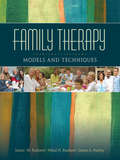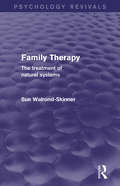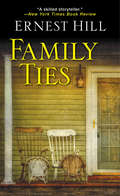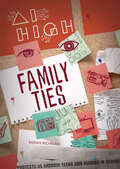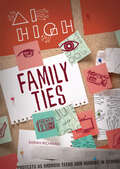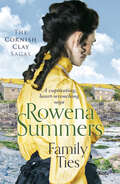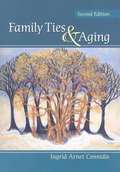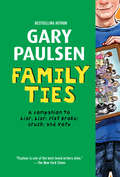- Table View
- List View
Family Therapy as Socially Transformative Practice
by Sally St. George Dan WulffThis thorough reviewof social justice in family therapy guides practitioners to incorporateconcepts of equity and fairness in their work. Expanding on the relationshipsbetween larger social contexts and individuals' family functioning, it offers practicalstrategies for talking with families about power disparities, injustice, and respect,and for empowering clients inside and outside the therapy room. Case studiesand discussions with therapists illustrate how family challenges are commonly exacerbatedoutside the home, and the potential for this understanding to help clients worktoward positive change while improving therapists' professional development. Thebook's accessible, solution-focused approach shows small therapeutic steps changingfamilies, communities, and clinical practice for the better. Included in thecoverage: Family therapy + social justice + daily practices = transforming therapy. Researcher as practitioner: practitioner as researcher. Learning to speak social justice talk in family therapy. Supporting the development of novice therapists. Everyday solution-focused recursion: when family therapy faculty, supervisors, researchers, students, and clients play well together. Family therapy stories: stretching customary family therapy practices. At once down-to-earth and inspiring, Family Therapy as SociallyTransformative Practice is a must read for those interested in familytherapy and family-centered practices and policies.
Family Therapy in Changing Times
by Gill Gorell BarnesThe new edition of this well-known text addresses the plurality of family life today, and considers the way in which the changeable 'theory of family' has influenced the approaches of those working with families. The emphasis in this second edition is on working in a context of cultural diversity and in which life transitions such as marriage, divorce and bereavement, affect the lives of all families, be they multi- or lone-parent, gay or heterosexual. This is an essential text for therapists and counsellors, both in training and in practice, who work with families.
Family Therapy in Focus (Counselling & Psychotherapy in Focus Series)
by Mark Rivett Dr Eddy StreetDrawing on many years' experience in practice, teaching and research, Mark Rivett and Eddy Street present philosophical, sociological and empirical views of family therapy. Balancing the perceived benefits against the potential limitations, they pose questions, which challenge those within the profession to think hard about their role. } does family therapy work? } can those most in need really be helped? } is family therapy a means of social control? } who does professionalization help? While most texts offer a straightforward and uncritical perspective, in contrast Family Therapy in Focus aims to stimulate debate among practitioners and to help trainees adopt a more reflective and critical attitude towards their own professional development and the development of their profession.
Family Therapy in Global Humanitarian Contexts
by Laurie L. Charlés Gameela SamarasingheThis book brings together a diverse set of clinicians, scholars, and researchers actively using systemic family therapy ideas within the context of ongoing or recent humanitarian intervention. The contributions focus on critical issues specific to the practice of family therapy within global mental health contexts, with a particular attention to the humanitarian sphere. Issues covered include treatment across cultures and language barriers, work in settings with covert and overt threats, practice in low-resource situations, and the creation of a family therapy program that relates to peace-building, reconciliation, and post-war discourse. The diverse group of authors contributes practical information and content specific to the training, supervision and/or delivery of family-based services, and offer specific principles and recommendations for family therapy practitioners and researchers.
Family Therapy with Muslims
by Manijeh DaneshpourFamily Therapy with Muslims is the first guide for mental health professionals who work with Muslims in the family therapy setting. The book opens with a section defining the similarities across Muslim cultures, the effects of postcolonialism on Muslims, and typical Muslim family dynamics. The author then devotes a chapter to different models of family therapy and how they can specifically be applied to working with Muslim families. Case studies throughout the book involve families of many different backgrounds living in the West—including both immigrant and second generation families—that will give professionals concrete tools to work with clients of their own.
Family Therapy with Suicidal Adolescents
by Anthony P. JurichThis book describes a blend of insight-oriented, behavioral, and strategic family therapy, which the author has developed over thirty-four years of dealing with suicidal adolescents. It aims not to replace other forms of therapy but to augment the therapist’s own therapeutic style. The book offers an informative and personally told story bringing together scholarship and meaningful glimpses into the thought processes of suicidal youth. Written in an understandable, friendly, and practical style, it will appeal to those in clinical practice, as well as graduate-level students pursuing clinical work.
Family Therapy: 100 Key Points and Techniques (100 Key Points)
by Mark Rivett Eddy StreetFamily therapy is increasingly recognised as one of the evidence based psychotherapies. In contemporary therapeutic practice, family therapy is helpful across the age span and for distress caused by family conflict, trauma and mental health difficulties. Because of this, many psychotherapists integrate elements of family therapy within their approaches. Family Therapy: 100 Key Points and Techniques provides a concise and jargon-free guide to 100 of the fundamental ideas and techniques of this approach. Divided into helpful sections, it covers: Family therapy theory Essential family therapy practice Using family therapy techniques Common challenges in family therapy Contemporary debates and issues Self issues for family therapists. Family Therapy: 100 Key Points and Techniques is an invaluable resource for psychotherapists and counsellors in training and in practice. As well as appealing to established family therapists, this latest addition to the 100 Key Points series will also find an audience with other mental health professionals working with families and interested in learning more about family therapy techniques.
Family Therapy: A Constructive Framework
by Dr Roger Lowe`I liked this book. Though I am not a family therapist, like most mental health nurses I try to bear in mind the family relationships of individuals I am working with. This is an enlightening text which not only offer a framework with which we can better understand the severe psychopathologies seen in forensic work, but also gives examples of how it may be used therapeutically' - Mental Health Practice `I think this is an important book that crystallises complex theory into a user-friendly model, using case material and discussions from the therapeutic community. A must have for counsellors working with families, this will form part of the recommended reading on the Family Counselling course' - Barbara McKay, Relate Head of Training, Relate News `The book provides a good overview of a number of recent approaches to working with families as well as how the author thinks about them' - Stephen Bray, Nurturing Potential `Roger Lowe achieves the almost impossible task of bringing together various theories, techniques and case examples in clear and accessible ways. Readers of all disciplines, from front-line hard-pressed practitioners to students on therapy and social work courses, will be grateful for the simple and, above all, useful way he tackles the burning questions that arise in working with the family group. Highly recommended!' - Harvey Ratner, Brief Therapy Practice, London Family Therapy introduces practitioners to the principles of using a constructive and collaborative approach with families. The approach builds on a strengths-based philosophy and focuses on enhancing family resilience and competence in a way that is both time-efficient and comprehensive. It brings together skills from contemporary models such as solution-focused, narrative and conversational therapies and adapts them to the specific challenges of working with family relationships. It is the first book to systematically integrate these influential approaches and apply them to family work. Setting out a clear framework for practice, Roger Lowe describes the key tasks for the therapist as: · hosting meetings · negotiating concerns, and · evoking family members' personal and relationship resources. The framework is designed to be clear but flexible, and to allow practitioners to adapt it to their own situational needs. For example, it suggests ways for practitioners to selectively 'borrow' from other therapeutic models while retaining a constructive orientation. It also explores ways in which therapists can use their 'inner' conversation during a session as a tool to overcome obstacles to the therapeutic process. Although there is a common belief that the approach is only suited to brief interventions, the author also describes ways of working constructively over a longer period of time. Throughout the book, case studies are included to show how the constructive framework is used in practice and to highlight a range of challenging situations that may be encountered during family therapy. Roger Lowe's book provides a refreshingly different approach to working with families, which chimes with the growing interest in constructive approaches. It is written for trainees and for practitioners who are interested in developing their skills in this collaborative and optimistic approach.
Family Therapy: An Intimate History
by Lynn HoffmanThis book follows the journey of one highly curious and questing therapist from an instrumental, causal approach to family therapy to a collaborative, communal one. Because Lynn Hoffman has been in the field for almost forty years and has worked with so many of its influential thinkers, the book is also a history of family therapy's evolution. Her knowledge of family therapy is intimate and deep; her perspective is clear-eyed and often wryly humorous. Readers will be reminded that, however big and impressive the theories, family therapy is very much a human endeavor. Hoffman revisits the experiences, ideas, and relationships that have informed her journey and presents them both as she perceived them at the time and as she perceives them now looking back. Through this process of reflective conversation, she creates not only a legacy out of the people and situations that acted on her most powerfully but also a countertradition to the strategic approach that influenced her so strongly early in her career. But this is not just history. Throughout her career Hoffman has been in the forefront of family therapy. She has interacted with and sometimes worked closely with many of family therapy's influential thinkers and actors, including Jay Haley, Virginia Satir, Dick Auerswald, Harry Aponte, Peggy Papp, Olga Silverstein, the Milan team, Peggy Penn, Harry Goolishian, Harlene Anderson, Tom Andersen, and Michael White. The evolution of her thinking has paralleled the major developments in the field. As she braids together continuity and innovation, she finds her own voice—a 'different voice'—and her own style—more open, more inclusive, and less controlling. In the second half of the book Hoffman demonstrates the many possibilities inherent in 'not knowing,' in working with a reflecting team, in looking for the 'presenting edge,' and in grabbing the 'emotional main chance.'
Family Therapy: An Overview (7th edition)
by Herbert Goldenberg Irene GoldenbergFirst published in 1980, this updated textbook--now in its seventh edition--provides an overview of the major theoretical underpinnings of family therapy and describes current clinical practices. Clinical cases illustrate the application of a particular set of techniques for each of the established schools of family therapy. Newer models, such as the social constructionist views, are also discussed. The volume concludes with a comparative overview of family theories and therapies.
Family Therapy: An Overview (Eighth Edition)
by Herbert Goldenberg Irene GoldenbergFAMILY THERAPY provides a balanced presentation of the major theoretical underpinnings and clinical practices in the field. By presenting an overview of traditional and evolving viewpoints, perspectives, values, intervention techniques, and goals of family therapy, Herbert and Irene Goldenberg provide current, relevant, practice-oriented content laying the foundation for students to become proficient family therapists. This edition reflects the Goldenbergs' commitment to providing students with not only traditional family therapy theoretical frameworks but also the field's evolving models of practice. It is the complete resource for assisting students in mastering the many facets of family therapy. For this edition, Michael White, founder of Narrative Therapy, has written a new foreword for the book.
Family Therapy: Concepts and Methods (10th Edition)
by Michael P. Nichols Richard C. SchwartzMike Nichols' engaging yet thorough guide has long been the standard in family therapy. The author describes and analyzes the field of family therapy, covering its history, schools, and developments. Numerous cases help readers appy theories to real situations and make the text even more engaging. Upon completing this book, readers will be able to: Describe clinical approaches Understand old and new developments in the field of family therapy Analyze successes and failures in research and the impact on current clinical practices Compare different schools of family therapy and explain the contemporary status of distinct schools of therapy
Family Therapy: Concepts and Methods (9th Edition)
by Michael P. Nichols Richard C. SchwartzFamily Therapy: Concepts and Methods is the definitive, classic in the field and covers all the major schools and developments in Family Therapy. Just some of the features that make this book so widely used -- Brief biographies and photos of some of the leading family therapists of the twentieth century; Extensive coverage of professional ethics, reflecting the need for students to have increased awareness of professional issues in family therapy; Unique issues family therapists encounter when providing home-based services; Latest research and data - often before that research is published in other forums. The Ninth Edition continues this tradition with many exciting revisions including: several new case studies a new summary of major theoretical concepts a new section on working with common forms of family triangles new sections on Sex and the Internet and Neuroscience and Relationships and much more! From the Preface - "One thing that tends to get lost in academic discussions of family therapy is the feeling of accomplishment that comes from sitting down with an unhappy family and being able to help them. Beginning therapists are understandably anxious and not sure they'll know how to proceed. ("How do you get all of them to come in?") Veterans often speak in abstractions. They have opinions and discuss big issues-postmodernism, narrative reconstructionism, second-order cybernetics. While it's tempting to use this space to say Important Things, I prefer to be a little more personal. Treating troubled families has given me the greatest satisfaction imaginable, and I hope that the same is or will be true for you." - Michael P. Nichols
Family Therapy: Fundamentals Of Theory And Practice
by William A. GriffinFirst published in 1993. Routledge is an imprint of Taylor & Francis, an informa company.
Family Therapy: History, Theory, and Practice
by Samuel GladdingFamily Therapy: History, Theory, and Practice covers all aspects of working with couples and families. Grounded in evidence-based practice and the rich theoretical background of marriage and family therapy, the text presents important background information on healthy functioning families of all different compositions, includes an overview of how individual and family life cycles intertwine, and concretely and clearly illustrates (with a wealth of examples) the evidence-based interventions used in working with families that need counseling. <p><p> Thoroughly updated with over 240 new citations, the 7th Edition has added separate chapters on Psychodynamic Family Theories, Bowen Family Systems Theory, Solution-Focused Brief Therapy, and Narrative Family Therapy.
Family Therapy: History, Theory, and Practice
by Samuel T. GladdingThe most thorough and well-written text in the field, Family Therapy: History, Theory, and Practice, covers all aspects of working with families. Beginning with an explanation of how individual and family life cycles differ and how healthy and dysfunctional families operate regardless of structure or ethnicity, the author clearly covers the basic processes involved in treating couples and families before delving into a dozen theoretical ways of treating families. Readers will learn about the history of family therapy, multicultural aspects of family therapy, ways of working with various types of families, ethical and legal issues involved in family therapy, and ways of assessing families. Thoroughly updated and revised, the fifth edition is logically organized into three sections-Understanding Families and Family Dynamics, Therapeutic Approaches to Working with Families, and Professional and Clinical Issues in Family Therapy. Each chapter has an abundance of examples and case studies, and discussion questions included at the end of each chapter help to engage class participation.
Family Therapy: Models And Techniques
by Janice M. Rasheed James A. Marley Mikal N. RasheedThis text offers a straightforward, comprehensive overview of both traditional and evolving theoretical models of family therapy and intervention techniques as well as a discussion of clinical issues unique to family therapy practice. Aiming to prepare students to develop beginning proficiency in family therapy, the authors outline major family therapy models in detail, including a step by step description of concepts, theories, skills, and techniques as well as a history of each model and its conceptual and theoretical underpinnings. The text also provides extensive case illustrations of family interviews that identify the specific stages, clinical issues, concepts, theories and techniques associated with each model. This core text is designed for graduate level courses such as Family Therapy, Marriage and Family Therapy, Marriage and Family Counseling, Family Systems Theory, and Family Counseling in departments of social work, psychology, nursing, education, or human services.
Family Therapy: Models and Techniques
by Janice M. Rasheed Mikal N. Rasheed Dr James A. MarleyThis text offers a straightforward, comprehensive overview of both traditional and evolving theoretical models of family therapy and intervention techniques as well as a discussion of clinical issues unique to family therapy practice. Aiming to prepare students to develop beginning proficiency in family therapy, the authors outline major family therapy models in detail, including a step by step description of concepts, theories, skills, and techniques as well as a history of each model and its conceptual and theoretical underpinnings. The text also provides extensive case illustrations of family interviews that identify the specific stages, clinical issues, concepts, theories and techniques associated with each model. This core text is designed for graduate level courses such as Family Therapy, Marriage and Family Therapy, Marriage and Family Counseling, Family Systems Theory, and Family Counseling in departments of social work, psychology, nursing, education, or human services.
Family Therapy: The Treatment of Natural Systems (Psychology Revivals)
by Sue Walrond-SkinnerDuring the late 1970s and early 1980s, there was a growing interest in family therapy as a potent tool for helping to bring about change and growth in many families whose lives had become stagnant, joyless or self-destructive. As it became more popular as a method of social work intervention, demands for training opportunities for professional workers increased. Despite this, however, there was very little writing on the subject produced in Britain at the time. Originally published in 1976 this practical text was aimed at the growing number of social workers who were anxious to add family therapy to their skills, and would also have been of value to psychiatrists, general practitioners, psychologists, and all those involved in the psychotherapeutic treatment of married couples and families who came to them for help. Using case illustrations, Sue Walrond-Skinner describes the theory behind family therapy and some of the techniques of treatment which the method uses. By extensive use of verbatim transcripts of interviews, she shows the minute-by-minute flow of a family therapy session and gives a clear idea of what can be and is achieved using this method of therapeutic intervention. A major part of social work today, this book shows where it all began.
Family Ties
by Ernest HillIn the acclaimed A Life for a Life, Ernest Hill created an unforgettably candid story of violence, love, and redemption with teenaged D'Ray Reid at its center. Now, with his jail time behind him, D'Ray has returned home to find that the real fight for survival is only beginning. . .Everyone was shocked when Mr. Henry took D'Ray Reid under his wing. After all, Mr. Henry's real son, Stanley, was murdered by D'Ray--a crime D'Ray committed to save his brother, Little Man. Yet in the years since, Mr. Henry has tried to show D'Ray how to become the man Stanley would never be.After Mr. Henry's death, D'Ray seeks out his own mother, Mira, hoping to rebuild their broken relationship. But D'Ray's homecoming is more tumultuous than expected. Arrested for a crime he didn't commit, Little Man has escaped and is in hiding. Mira blames D'Ray for Little Man's troubled history, but she has her own secrets to hide. And putting things right will mean uncovering a legacy of lies and hidden agendas, and realizing the only way to be free of the past is to stand tall and confront it at last. . .Praise for the novels of Ernest Hill"If novels offer us a way of seeing the world that we could not imagine before, A Life for a Life does just that." --The Times-Picayune"An exceptional literary piece that some readers will compare to Richard Wright's Native Son."--Booklist on Satisfied with Nothin'"As the story unfolds. . .these unforgettable characters come to full, sympathetic life."--Publishers Weekly on A Person of Interest"A skilled storyteller." --New York Times Book Review
Family Ties (AI High)
by Sarah RichmanWhen android teens join humans in high school, nothing will ever be the same. Julie's family is very much anti-android. Her parents don't want androids in her school or even in their town. When Julie gets to know a group of androids at school, she questions whether her family's prejudices were correct. Then she learns her parents have joined an anti-android group and have plans to protest the androids at prom. Julie will have to choose between her family and standing up for what's right.
Family Ties (Ai High Ser.)
by Sarah RichmanWhen android teens join humans in high school, nothing will ever be the same.Julie's family is very much anti-android. Her parents don't want androids in her school or even in their town. When Julie gets to know a group of androids at school, she questions whether her family's prejudices were correct. Then she learns her parents have joined an anti-android group and have plans to protest the androids at prom. Julie will have to choose between her family and standing up for what's right.
Family Ties (The Cornish Clay Sagas)
by Rowena SummersFinancial woes and a handsome stranger shake up one woman&’s marriage in this heart-wrenching historical saga of love and family. Ben was no longer the man that Morwen married. As financial troubles wrack the Killigrew household, the passion and strength of the man she loved so dearly seem to ebb away, leaving the clay works in an abject state. Into this turbulent landscape arrives a dynamic stranger from America. With familial ties to the Killigrews, Randell Wainwright is determined to forge a stronger bond with one particular person—Morwen. In him, she sees everything her husband once was: compassionate, clear-sighted and virile. As old hurts are renewed, as bitter family quarrels rage, and as blackmail and tragedy threaten the foundation of her home, Morwen struggles to save her name, and her family, from destruction. Perfect for fans of Maureen Lee, Linda Finlay, and Lesley Pearse.
Family Ties and Aging (2nd Edition)
by Ingrid Arnet ConnidisThis textbook covers issues of family ties and aging broadly to provide an integrated and thorough representation of what we know from the current research. The text includes groups and relationships exploring such neglected populations as single, divorced, and childless older people and their family relationships, sibling relationships among the elderly, live-in partnerships not formalized by marriage, and the kinds of family ties forged by gay and lesbian persons over the life course.
Family Ties: The Theory, Practice, And Destructive Properties Of Relatives (Liar Liar)
by Gary PaulsenFamily fun takes center stage in three-time Newbery Honor winner Gary Paulsen's hilarious novel for middle-school boys. Kevin Spencer is the glue that holds his family together. When his wacky relatives decide to have a double wedding in the backyard, Kevin takes charge. Planning two weddings is a great way to impress his girlfriend, Tina Zabinski, the Most Beautiful and Best-Smelling Girl in the World. But as more and more relatives come to stay, things spiral out of control. Tying the knot has Kevin tied up in knots in this laugh-out-loud story. "When it comes to telling funny stories about boys, no one surpasses Paulsen."--Booklist "[Paulsen is] one of the best-loved writers alive."--The New York TimesFrom the Hardcover edition.
